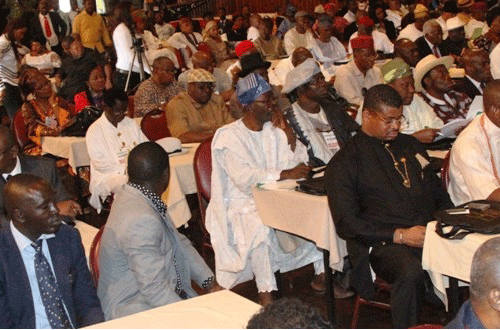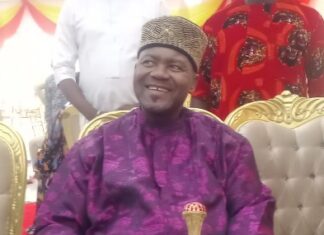Calm returned to the Committee on Devolution of Power on Tuesday when members met in closed session to debate the amendment to Item 39 on the Exclusive Legislative List of the 1999 Constitution.
However, for the third time, at the end of the three-hour deliberation, no decision could be reached as each side of the divide presented incompatible positions on the issue.
Confab delegates
As contained in the Exclusive Legislative List of the 1999 Constitution, Item 39 deals with the exclusive rights of the Federal Government to legislate on issues regarding “mines and minerals, including oil fields, oil mining, geological surveys and natural gas.”
While delegates from the north wanted the status quo maintained as contained in the current constitution, delegates from the south believed the item could still remain in the Exclusive Legislative List but with some modifications.
Part of the modifications, according to them, is to enable state governments have some level of involvements when legislations regarding mining of mineral resources deposited in their areas are being drafted.
This position was opposed by delegates from the north who believe that it would give an unequal advantage to the south since according to them, not all the states in the north have natural minerals.
The Committee had cut-short its break time on Tuesday from two hours to one hour to enable members take a decision on the item whose discussion started on Thursday last week.
Former Governor of Akwa Ibom State and Co-Chairman of the Committee, Obong Victor Attah told journalists at the end of the closed session that he was hopeful of a final decision on Wednesday as a lot of progress had been made.
Meanwhile, the Committee on Political Restructuring on Tuesday continued their debate on which system of government, between Presidential and Parliamentary, will well suit Nigeria.
At the end of the debate, delegates seemed to be tilting towards adoption of a modified Presidential system, which is a mixture of some elements of the Presidential System and the Parliamentary System.
Former Governor of Rivers State, Dr Peter Odili said the Presidential System has brought many challenges to governance and it was necessary to look at other systems as practiced in other countries that are not purely Presidential or wholly Parliamentary.
While advocating a system that all Nigerians will buy into, Odili demanded that all shades of opinion on the issue be expressed and examined before any decision is taken.
He said, “Those that introduced the Presidential System had the best interest of the nation at heart, but the practice has caused us problems.”
According to Odili, the Presidential System is not only expensive to operate; it also has the tendency to lead to dictatorship as it creates room for too much power to be under the command of one individual.
Therefore, he said, “in terms of checks and balances, Parliamentary system of government is more effective,” and concluded by recommending “a modified Presidential System that embodies Parliamentary System which will help us reduce waste and guarantees stability of government.”
Professor Issa Baba Mohammed in his contribution, cautioned against experimenting with too many systems of government.
“What we should do is to do serious adjustments in terms of looking at the present system and see how we can improve it,” he said.
Former Governor of Niger State, Engineer Abdulkadir Kure, spoke in support of a hybrid system lying midway between the Presidential and the Parliamentary Systems because, “we can’t afford to change government regularly.”
He advocated a system whereby the President will come from one section of the country while the Prime Minister will come from another part of the country.
At the end of the heated debate full of ideas on what system should be adopted, a 10-man Sub-Committee headed retired Air Vice Marshall Moukhtar Mohammed was set up to harmonise all the different proposals on the discussion and submit its report on Wednesday (tomorrow).
Still on Tuesday, the Committee on Foreign Policy and Diaspora Matters met with the Director of the Technical Aids Corps, Dr. Pius Oshunyekanmi, on the activities of the organization who briefed delegates on how it has enhanced the nation`s foreign policy.
Dr. Oshunyekanmi lamented the politicization of the academic environment that discourages Nigerian academics in the diaspora from contributing to research and learning in the country. He solicited for the help of the committee to build a robust platform that would help Nigerians in the diasporas integrate into the nation academic system.
He said more countries are soliciting for the help of the corps to set up departments of Nigerian local languages in their higher institutions of learning. He reiterated the need to spell out the directorate’s clear objectives and the need for the corps to be strengthened to integrate Nigerians in the diaspora.
The minister of Information Mr. Labaran Maku also appeared before the committee. He agonized over the collapse of values and the difficult time the country was passing through. He advocated for an ombudsman to watch and guide the media even as he expressed his believe in free media as fundamental to a free society.
A member of the committee Ambassador Yusuf Mamman advocated the scraping of Nigeria Broadcasting Commission. He said that the commission was a toothless bull dog and corrupt. Another member, Adebayo Oladimeji suggested the re-activation of Nigeria Today, a weekly tabloid published by the Nigeria High Commission in London to correct the negative reportage of Nigeria by the media. George Aboi wanted to know what government was doing to properly coordinate all agencies of government responsible for laundering Nigeria’s image.
The Presidential Committee on Land Reform also made a presentation to the Committee on Land Tenure Matters and National Boundaries.
In the twenty page presentation by the chairman of the committee, Professor Adeniyi, issues of land governance, current government efforts harnessing the wealth inherent in appropriately titled and registered land, adoption of systematic land titling and registration and preparation of draft regulations were exhaustively tackled.
Professor Adeniyi recommended among others: the establishment of a National Land Commission, improvement of poor state of mapping and map production in the country, systematic land titling and registration programme and removal of the Land Use Act from the constitution.
Also, the Deputy Comptroller General of Customs, Tariff and Trade G.T Aliu, addressed members of the Committee on Public Finance on ways of improving on revenue collection. On waiver and exceptions, the Customs’ chief agreed that if implemented appropriately, waiver could be a good incentive. He however said it should not be given selectively.
On the seven per cent given to the Customs whenever there is surplus in revenue generation, the DCG said the organization scarcely records surplus, but has a way of managing its revenue.
The Chairman of the Committee, Alhaji Adamu Aliero, described as unwise the 100 per cent import duty on rice. He said the policy gave way to smuggling of rice across the nation’s border especially from Benin Republic. The DGC said the customs was working on ways to accurately measure the quantity of crude oil at the point of loading
He said there are about 22,000 custom officers across the country.
The committee also listened to a presentation by an NGO, Legislative Watch. In a presentation by its Executive Secretary, Hon Ngozika Ibouma, the organization suggested, among others: the abolition of the Joint State and Local Government Account, abolition of the Office of the Auditor General of Local Government at state level, expansion of the Revenue Act to include all items contained in section 162(10) if the 1999 Constitution.
The committee promised to present all the recommendations to the conference.













